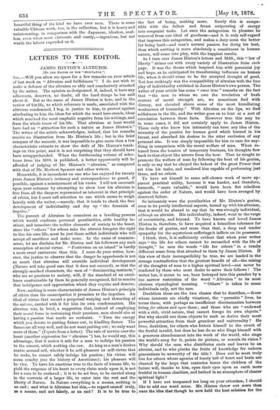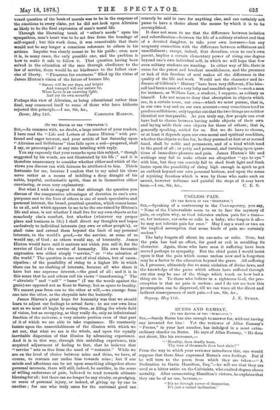LETTERS TO THE EDITOR.
JAMES FIINTON'S ALTRUISM.
[TO THE EDITOR OF THE "SPECTATOR."]
Srn,—Will you allow me space for a few remarks on your article of last week on "Altruism and Selfishness "? I do not wish to make a defence of the altruism so ably and conclusively attacked by the writer. The opinion so designated, if, indeed, it have any adherents, deserves, no doubt, all the hard things he has said about it. But as the name of James Hinton is here, and in the review of his life, to which reference is made, associated with the altruism condemned, I beg, in justice to him, to protest against attributing to him the ideas for which the word here stands, ideas which received the most emphatic negative from his writings, and from the whole tenor of his life. That altruism at least would have had no "attraction for such a nature as James Hinton's." The writer of the article acknowledges, indeed, that his remarks receive no illustration from Mr. Hinton's life ; but in the brief compass of the memoir, it was impossible to give more than a few characteristic extracts to show the drift of Mr. Hinton's teach- ings on this point, and it is not surprising that they should have been misapprehended. When the forthcoming volume of selec- tions from his MSS. is published, a better opportunity will be afforded of judging of Mr. Hinton's "altruism," as compared with that of Mr. Herbert Spencer and other writers.
Meanwhile, it is incumbent on one who has enjoyed for twenty years James Hinton's intimacy and correspondence to guard, if possible, against a misstatement of his views. I will not encroach upon your columns by attempting to show how his altruism is free from all the dangers represented as inherent in that principle of ethics, but I must call attention to one which seems to weigh heavily with the writer,—namely, that it tends to check the free development of individuality and dry up "the fountain of impulse."
The pursuit of Altruism he conceives as a levelling process which would eradicate personal peculiarities, stifle healthy in- stinct, and immolate the nobler elements of society to the baser, since the " others " for whose sake the altruist foregoes the right to live his own life, must be just those selfish individuals who will accept all sacrifices and make none. In the name of common- sense, let me disclaim for Mr. Hinton and his followers any such conception of social virtue. "Positivism on an island" is hardly a more cruel caricature than this. I must do your writer, how- ever, the justice to observe that the danger he apprehends is not so much that altruism will override individual development (Nature will take good care that it does not succeed), as that the strongly-marked characters, the men of "domineering instincts," who are so precious to society, will, if the standard of an excel- lence unattainable by them be generally recognised, fail to receive that indulgence and appreciation which they require and deserve. Now, nothing is more characteristic of James Hinton's principle of ethics than the emancipation it promises to the impulses. An ideal of virtue that meant a perpetual warping and thwarting of the nature, carried with it for him its own condemnation. His altruism was, in brief, a suggestion that, instead of employing their moral force in restraining their passions, men should aim at having a passion that needs no restraint. "Turn the energy which you devote to putting flames out, to kindling flames. The flames are all very well, and do not want putting out ; we only want more of them." (I quote from a letter). The rule of service over the heart (another expression for "altruism ") has, he would say, this advantage, that it makes it safe for a man to indulge his passion to the utmost, which nothing else can. As long as a man's desires centre around self, whether it be self-pleasure or self-virtue that he seeks, he cannot safely indulge his passion ; his virtue will mean cruelty (see the history of Asceticism); his pleasure will be vice. To have his emotions true to the facts of human life, to yield the response of his heart to every claim made upon it, is not for a man to be enslaved ; it is to be set free, to be carried along in the currents of a larger life, to enter into the rest and the liberty of Nature. In Nature everything is a means, nothing is an end ; and what is Altruism but this,—to regard oneself truly, as a means, and not falsely, as an end ? It is to be true to the fact of being, nothing more. Surely this is compa- tible with the fullest and freest outpouring of energy into congenial tasks. Let once the antagonism to pleasure be- removed from our ideal of goodness--and it is only self-regard that imposes this antagonism, and makes a duty seem the better- for being hard—and man's natural passion for doing his best, than which nothing is more absolutely a constituent in human. nature, will come into play, with the happiest results.
As I turn over James Hinton's letters and MSS., this "law of liberty" shines out with every variety of illustration from each page. It was the theme which inspired him with perennial joy and hope, as he anticipated its transforming influence on human. life, when it should come to be the accepted thought of good. Notless strikingly was the compatibility of altruism with the free. play of individuality exhibited in James Hinton's own person. The writer of your article has some " ower true "remarks on the fact- that "the men to whom we owe the revelation of fresh, sources of moral strength are, we sometimes find with dismay, not elevated above some of the most humiliating weaknesses of humanity." With Altruism on the lips, we find selfishness in the life, and the writer goes on to hint at a sort of correlation between these facts. However true this may be in some cases, it did not certainly apply to James Hinton. Those only who knew him intimately can have any idea of the intensity of the passion for human good which burned in his breast, and absorbed his desires to the utter exclusion of any personal aim. It was simply impossible for him to care for any-- thing in comparison with the moral welfare of man. When re- leased from the tension of temporary business, his thoughts flew back to that object like arrows from the bow. That he sought to promote the welfare of man by following the bent of his genius,. is only to say that he obeyed the behest of the great Power that set him his tasks, and rendered him capable of performing just those, and no others.
To have set himself to some self-chosen work of more ap- parent practical utility, because it was harder, and therefore,. forsooth, "more valuable," would have been flat rebelliom against the order of Nature, and would have been avenged by deserved failure.
So intimately were the peculiarities of Mr. Hinton's genius,. even in its purely intellectual aspects, bound up with his altruism,. that it would be absurd to say that he was strongly individual, although an altruist. His individuality, indeed, went to the verge- of eccentricity, and beyond. To have known and loved James Hinton is, therefore, to have acquired a boundless tolerance for the freaks of genius, and more than that, a deep and tender sympathy for the mysterious sufferings it inflicts on its possessor.- I think, then, it is sufficiently evident that when your writer says "the life for others cannot be reconciled with the life of thought," he uses the words "life for others" in a totally, different sense from that attached to them by James Hinton. If this view of their incompatibility be true, we are landed in the strange contradiction that the greatest benefit of all—the raising of the thoughts of man to a higher spiritual level—can never be' rendered by those who most desire to serve their fellows I The writer has, it seems to me, been betrayed into this paradox by a. too narrow restriction of the word " Altruism " to its most obvious etymological meaning. " Others " is taken to mean, individuals only, not the race.
Doubtless these are the two classes that he describes,—those whose interests are chiefly vicarious, the " parasitic " lives, he terms them, with perhaps an insufficient discrimination between living for others and upon them ; and those who are "endowed with a rich, vivid nature, that cannot forego its own objects." But why should not those objects be such as derive their most powerful attraction from their grandeur and universality ? He. lives, doubtless, for others who fetters himself to the couch of the fretful invalid, but does he less do so who flings himself with a generous abandonment into the work of the world, who sings the world's song for it, paints its picture, or reveals its vision ?' Why should the man who distributes coals and loaves be an altruist, and he who plucks the fruits of knowledge for unborn generations be unworthy of the title ? Does not he most truly live for others whose agonies of lonely toil of heart and brain are- cheered by the hope that centuries hence the children of the- future will, thanks to him, open their eyes upon an earth more fruitful in human charities, and bathed in an atmosphere of clearer spiritual light ?
If I have not trespassed too long on your attention, I should; like to add one word more. Mr. Hinton threw out more than once the idea that though he now held the best solation, for the vexed question of the basis of morals was to be in the response of the emotions to every claim, yet he did not look upon Altruism
en likely to be. the final expression of man's moral life.
Through the liberating touch of "others needs" upon his sympathies, man's heart was to be set free from the bondage of self-regard ; but this work done, it was conceivable that there -would not be any longer a conscious reference to others in his actions. Impulse was clearly meant to be his guide ; even now it is, in many cases, the only possible one, and the problem is how to make it safe to follow it. That question having been solved in the education of the race through obedience to the law of service, there would be no hindrance to the fullest exer- cise of liberty. "Pleasures for evermore" filled up the vistas of James Hinton's vision of the future of human life.
"Serene will be our days, and bright
And tranquil will our nature be, When Love is an unerring light, And joy its own security."
Perhaps this view of Altruism, as being educational rather than final, may commend itself to some of those who have hitherto rejected this principle.—I am, Sir, &c.,



































 Previous page
Previous page